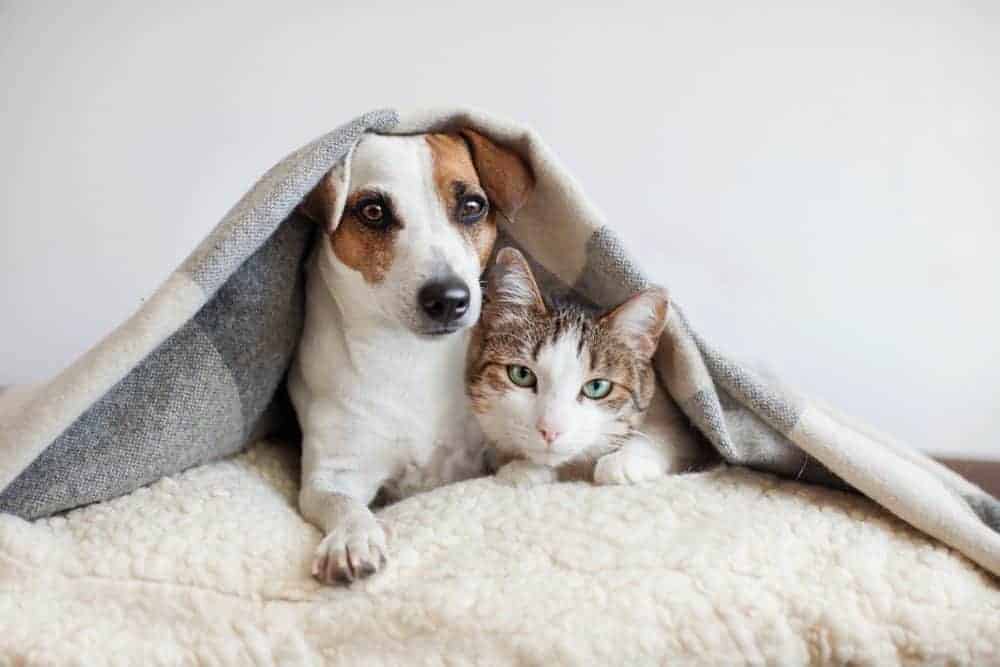
For pet owners, the beginning of November can mean stressful times ahead. For a week or more, the prospect of unexpected bangs and flashes that terrify dogs, cats and small furries is a seasonal challenge that many pet owners dread.
There are, of course, lots of practical steps that owners of dogs, cats, rabbits, guinea pigs, ferrets and small indoor pets can take to help their furry friends to cope, which you can read more about here
However, there’s one piece of advice which is routinely handed out every year, particularly to dog owners, that’s now in dispute – that humans should not make a fuss of a worried and anxious canine.
Animal behaviour experts at rehoming charity Dogs Trust are challenging this, stating: "In the past, advice has sometimes been to ignore dogs and not give them a fuss if they are scared. But if you suddenly withdraw reassurance when they are terrified by noises it is likely to cause them to be very distressed.”
Dr Rachel Casey, director of behaviour research at the charity, explains that the new advice is based on a greater understanding of how dogs' brains work, and evidence that ignoring dogs does not help them cope with the stress of loud fireworks.
49% of dogs show some behavioural signs of fears to loud noises such as fireworks*
She says: “Many of us enjoy the experience of fireworks, but for our dogs it’s often a terrifying and confusing experience. Dogs have approximately four times more sensitive hearing than humans, and also have a more extensive range of hearing – they can hear much higher frequency sounds than we can – so just imagine how loud a firework bang is for a dog. The smells and flashing light of fireworks are also unusual for dogs and can cause extreme distress to our four-legged friends. Fireworks tend to be sudden, unpredictable and bright. This combination of effects can often have a profoundly negative and in many cases, lasting impact on dogs.”
“Imagine if you went to your family for reassurance about something upsetting, and they all completely ignored you”
Commenting in The Telegraph, she said: “I've done research into the prevalence of fireworks, and half of dogs react by showing some signs of fear. Some people say they used to reassure their dogs and now they don't but that hasn't made the problem any better. They are a species which has co-evolved with us and is very dependent on human attention. Imagine if you went to your family for reassurance about something upsetting, and they all completely ignored you. That actually makes your stress and your worry worse. You need to learn that self-reliance when you're away from that stressful situation."
Dr Casey advises that dogs should be petted to help them deal with the immediate situation and later taught other coping mechanisms, such as going to a comforting safe place like a den. She adds: "In the long term it is better that your dog is not reliant on your attention when he or she is worried – but changing this is a long-term aim, not something to start when he or she is panicking with fireworks going off."
Dogs Trust’s top tips to easing the stress of Bonfire night
- Provide a safe hiding place – a suitably sized cardboard box will do – in your dog’s favourite room of the house, or create a den.
- Close the curtains and turn up the volume of your television or radio to drown out the firework noises. You could also try putting on the washing machine or doing some vacuuming – as long as these are everyday sounds that your pets are used to and are happy about.
- Remember not to shut any internal doors, as your dog may feel trapped and panic.
- Never leave your dog alone in the house, as he may panic and injure himself.
- Feed a stodgy high-carbohydrate meal with well-cooked rice or pasta in the late afternoon as this may help make your dog feel sleepier and calmer during the evening.
- Make sure your dog goes out to toilet before it gets dark and the fireworks start.
- Try to keep your dog busy with games or reward-based training, to keep his mind off the noises.
- Ask your vet about ADAPTIL – Dog Appeasing Pheromone. This is a scent which you can’t smell that comes in a plug-in diffuser, spray or collar that can comfort your dog and help him cope with his fears. Pet Remedy is another calming product, which can help dogs, cats, rabbits and other small pets.
- For dogs with very severe fears there are now several drugs available which reduce anxiety levels. Your vet may be able to supply Diazepam, which will not stop your dog from being scared during the night, but causes short term memory loss, so that he won’t remember being scared in the morning. This stops the cycle of fear becoming worse, but it’s important to do some training to lessen the problem for the next time.
- Further advice from Dogs Trust about preventing and dealing with fear of loud noises through sound training can be found here >>
Sources: *Emily J. Blackwell, John W.S. Bradshaw, Rachel A. Casey, Fear responses to noises in domestic dogs: Prevalence, risk factors and co-occurrence with other fear related behaviour, dogstrust.org.uk, telegraph.co.uk














